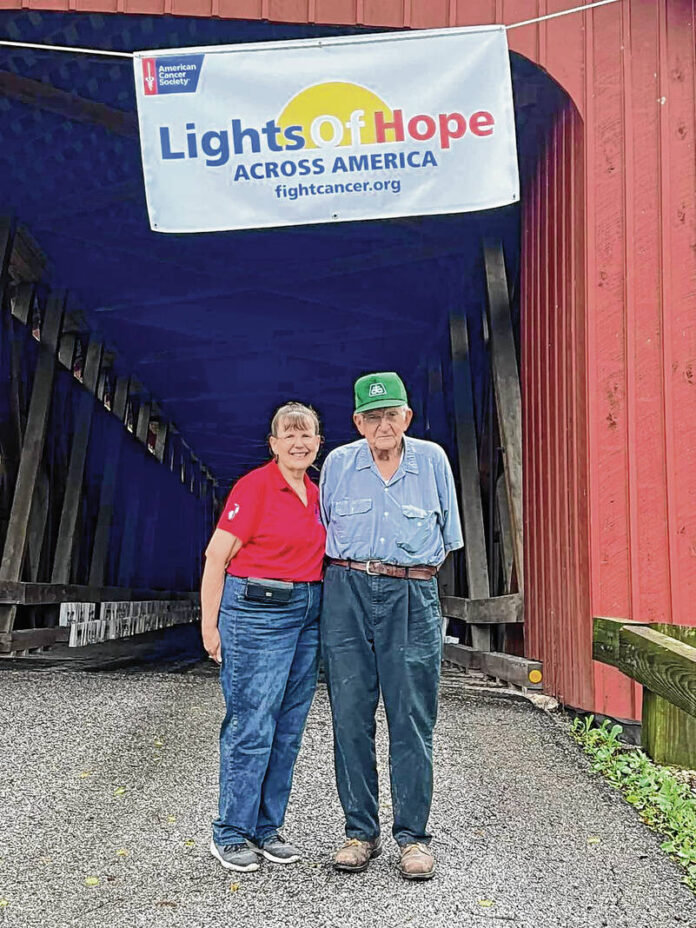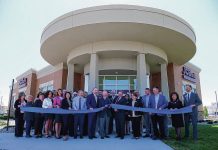
Mary Kost and her father, Robert Keller, 87, who survived stage 4 kidney cancer diagnosed more than four years ago, stand before the James Covered Bridge near Commiskey during the Jennings County Lights of Hope event Sept. 3.
For Mary Kost, the fight against cancer is deeply personal, and it’s one she champions from her dad’s hometown of Commiskey all the way to the nation’s Capitol.
“Like many people, I have had lots of family and friends touched by cancer,” Kost said.
She lost her mother-in-law, Wilma Kost, to a rare form of cancer called leiomyosarcoma. But Kost said after her mother-in-law’s diagnosis 25 years ago, Wilma had the opportunity to participate in a clinical trial that led to new treatments that since have become the standard of care.
Importantly, those advances in care through research and trials led to remarkable improvements in the rate of survival from leiomyosarcoma and other soft-tissue cancers. A 2015 study archived at the National Library of Medicine found that a patient with these types of cancer in 2015 generally had five-year survival rate of 62%. Back in the 1990s, when Wilma Kost was diagnosed, that same survival rate was just 28%.
Advances like that, Kost said, give her hope as a volunteer for the American Cancer Society Cancer Action Network.
“I have seen firsthand the strides we have made in fighting cancer. I know the work I do keeps these advancements moving forward. Seeing this gives me hope for better treatments and more cures,” she said by email while on a lobbying trip last month to Washington, D.C.
Kost was on Capitol Hill to press Indiana senators Mike Braun and Todd Young to support bills to fund cancer research and care including the Medicare Multi-Cancer Early Detection Screening Coverage Act, HR 1946/S. 1873. If passed, that legislation supported by ACSCAN would extend Medicare coverage to cover multi-cancer screening tests, which can detect more than 50 forms of cancer in the earliest stages, when treatment is most successful.
Closer to home, Kost, a Jennings County native who now lives in New Albany, organized the third annual Jennings County Lights of Hope event to raise funds for cancer research. The event over this past Labor Day weekend featured luminarias in honor of those lost to or touched by cancer. It took place at the historic James Covered Bridge, about a mile from the home of Kost’s father, former farmer and Cummins Inc. retiree Robert Keller.
By simply being there, Keller, 87, had himself beaten the odds.
‘Unheard of’
Four years ago, at age 83, Keller was diagnosed with stage 4 kidney cancer. Dr. Chandru Sundaram at IU Hospital in Indianapolis used robotic surgery to remove Keller’s cancerous kidney, beginning what is typically a long and challenging recovery journey.
Kost said the surgery was complicated and took several hours longer than anticipated because her father’s cancer had moved from his kidney into the artery connecting to his heart. But because Sundaram was using robotic surgery allowing minimal incisions and extreme precision, Keller’s recovery time was reduced.
And Keller soon demonstrated he was no ordinary 83-year-old stage 4 cancer patient. “Just three days after the surgery,” Kost said, “he walked three laps at IU Hospital without stopping.”
Dr. Stephanie Wagner, a hematologist and medical oncologist at Columbus Regional Hospital, developed a treatment plan for Keller after his surgery and subsequent treatment for growths that had metastasized to his lungs. She explained matter-of-factly about what Keller had been up against.
“Technically, right now, he would be about four years out from having stage 4 disease, and if you look at the five-year survival rate, only 8 to 12% of patients with stage 4 renal cancer will make it” to five years post-diagnosis, Wagner said.
“Immune therapy has just changed everything completely,” she said.
Wagner explained that unlike traditional chemotherapy, which works on all cells in the body in order to destroy cancer cells, immune therapy activates a person’s immune system, which fights off cancer cells. Immune therapy also has far fewer side effects than chemotherapy. The most common side effect is inflammation.
One difference with immunotherapy, however, is it takes longer to work. Patients must continue monthly treatments usually over the course of several months, sometimes years, Wagner said, to sufficiently boost their immune system until cancer cells are no longer present.
Wagner started Keller on an immune therapy treatment regimen using a drug called Opdivo. Uncharacteristically, though, Keller developed signs of a possible side effect and Wagner said the regimen had to be halted after four monthly treatments.
Keller kept coming for checkups, though, and Wagner said she was amazed at what she saw soon after his treatments stopped.
“He only had four (Opdivo) treatments, and basically all his disease is gone,” Wagner said. “That’s really unheard of for stage 4 disease. … The last treatment he had was over two-and-a-half years ago.”
Keller still checks in with Dr. Wagner and her staff for appointments every six months, and Wagner said he’s doing well. Well, even better if she’s being candid.
“He’s wonderful. … He’s a very robust 87, and just a super nice guy and has a great head of hair,” Wagner said with a laugh.
Sound advice
Back at the covered bridge near Commiskey, Keller and her daughter were among hundreds of people lighting candles Sept. 3 in honor of loved ones who have lost their lives to cancer or who have been touched by the disease.
The hundreds of flickering lights lining a picturesque covered bridge included loving, solemn and encouraging personal tributes, but together they express a common hope. Each luminaria also represents a donation of at least $10. Matched by hundreds and thousands of candles flickering at hundreds of similar events nationwide, such events express a collective desire to eradicate cancer.
“Having a local event provides an opportunity for people in our community to see and experience the impact they have on fighting cancer,” Kost said. “It’s a way to honor and remember our loved ones who have been touched by cancer and at the same time, ask lawmakers for their support of increased funding of cancer research.”
Kost also wants lawmakers in Congress to make clinical trials available to more cancer patients regardless of their economic means or where they live. She said the DIVERSE Trials Act, HR 5030, S. 2706, would do that. It also would make more clinical trials possible, because barriers of cost and geography sometimes limit the ability to conduct trials, or those barriers may result in trials that underrepresent people in certain racial and ethnic groups, older adults, rural residents, and those with limited incomes.
Everyone should have the same opportunity to benefit from potential advances in cancer treatment, she said.
“If it were not for the grace of God and cancer research, Dad would not be here today,” Kost said.
“We are so thankful for the great strides and advancements in cancer research, but there is still so much more work to be done. My Dad is just one of many — way too many family members and friends — who have been touched by cancer. Having seen clearly, up close and personal, how cancer research is making a positive impact on the lives of cancer patients, I want to continue to fight for increased cancer research funding as well as programs that support cancer survivors and their caregivers.”
For his part, Keller said since he’s recovered that he has to watch his diet, especially limiting salt and potassium. His recovery has slowed him down some, but he said he’s grateful to be alive, thanks to the care and support he received.
“It has limited me in some of the things I’d like to do,” he said. “I’ve always had a positive attitude and I just don’t worry too much about things.”
Having beaten staggering odds, Keller also offered advice for anyone who receives a cancer diagnosis: Seek out opinions and follow the advice of doctors you feel most comfortable with. Keller said he has been blessed with great doctors, friends and family supporting him.
Most importantly, though, Keller said someone who finds out they have cancer should act without delay in getting treatment.
“It’s easier to put out a campfire than a forest fire,” he said.




